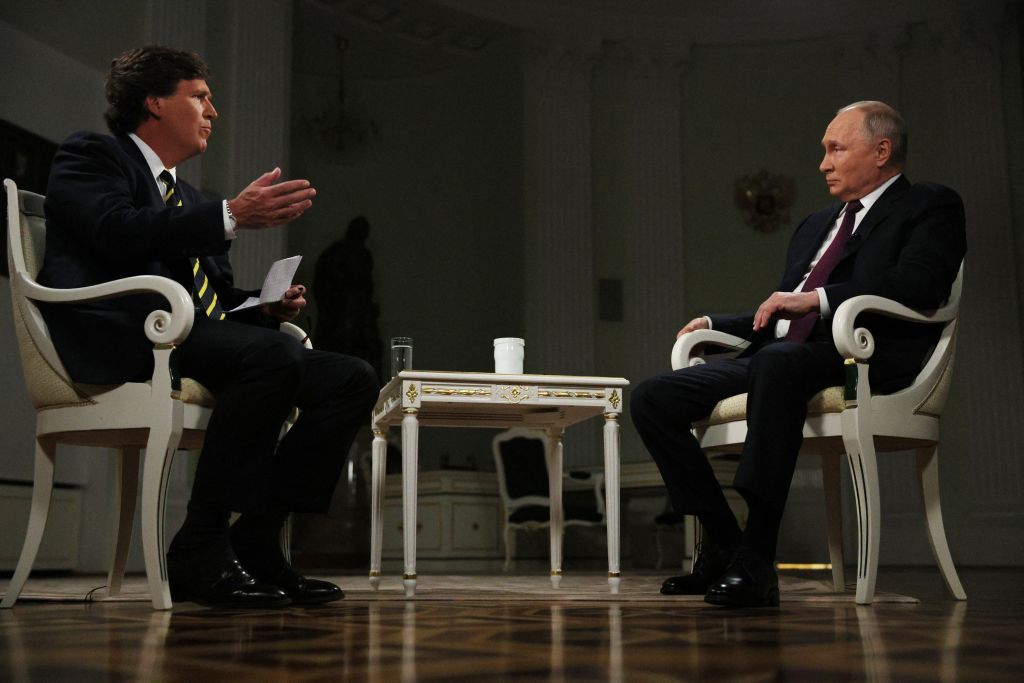Could the subject of the Sudetenland have been resolved more satisfactorily if Adolf Hitler had been given a more open platform? Somewhere he could really air his views? No messing, no clipping. Four hours on Joe Rogan, perhaps?
It’s a historical what-if stirred up again this week by Tucker Carlson’s interview with Russian leader Vladimir Putin. The rangy two-hour session at the Kremlin, trailed for days, became available on Tucker’s website yesterday. It makes for uneven listening. Early expectations were of a blockbuster that could have become the most-viewed video in the history of Twitter/X. They have been wide of the mark.
For all his newsmaker status, the President begins with a 20-minute discursion into the origins of the Russian state that takes us back as far as 862 and the Kievan Rus. Its chief amusement is in witnessing the panic spread across Carlson’s face, five minutes in, as he realizes that Putin has still only progressed as far as 978 and Volodymyr the Great. By the time we get to the Grand Duchy of Lithuania, there are callouses forming around Tucker’s elfin ears.
This, though, is the gig. Tucker claims to represent a new mode of journalism, an outsider energy taking on the stale old media. In that he is right.
The new mode is one that has been spilling out through podcasts for at least half a decade. You might call it the Long Hear. Its chief characteristic is that it doesn’t do the thing that house-trained journalists are meant to do: asking pointed, stabby questions and following up with detailed rebuttal.
Instead, it is about listening. It is about nodding. It is about saying “Mm,” “Uh huh” and also “Hmm.”
Joe Rogan pioneered this model years back. Start the tapes. Create a warm safe space. Lubricate your subject’s ego until they can firmly be themselves, then let them extemporize.
Many more have followed. Take Steven Bartlett, whose Diary Of A CEO podcast regularly tops the charts in Britain. His emollient questions are often preluded with a few helpful nods to the guest’s ego, and a little bit of self-disclosure on his part, to get the empathy the flowing. Bartlett keeps most of his work to under ninety minutes. But there are many others who go long: Lex Fridman, Chris Williamson, Jordan Peterson, will all top three hours on occasion.
Another term for it might be the Emetic Model Of Interview. Better out than in. Psychoanalysis by other means. Lie on the couch, and allow us the full 360 on who you actually are, guard down.
The best bits of these kinds of interviews are in the diversions. It’s the small nuggets. It’s not Elon Musk talking about AI, it’s the window into his world provided when he talks about his very teenage thing for Monty Python.
The BBC bulletins pointedly did not lead on the Carlson interview. In fact, it was treated as a weird “and finally” moment, only mentioned at the end: “Oh, by the way, the most watched event of the past twenty-four hours is the only western interview with the man who holds Europe’s fate in his hands.”
It is about listening. It is about nodding
The game is moving away from them. Occasionally, a legacy media organization will decide that it too must embrace the Long Hear, and copy it. It must figure out where all those pesky audiences went five years ago — and this time it’s serious.
But old media can’t cope with the range, the bagginess, the daft cul-de-sacs and chaos energy of a good Long Hear. It is cruel to make them try, as many of their efforts show.
There are of course plenty of good reasons why the BBC’s Russia editor Steve Rosenberg should have been in that draughty Kremlin chair. He’s a world expert on Russia with a forensic questioning style, for a start. But that’s just not the gig.
The terse BBC report on the interview pointed out that Tucker had not mentioned potential war crimes in Bucha. The Corporation cannot see that mentioning war crimes in Bucha is actually a real buzzkill; just not good party chatter.
Carlson has set himself up in opposition to all that. The Long Hear has its plusses. But it is also how he found himself sat in an over-large Kremlin sitting room, a translation bug plugged into his ear, looking increasingly alarmed as Putin wound himself up towards the Siege of Vienna.
This article was originally published on The Spectator’s UK website.


























Leave a Reply